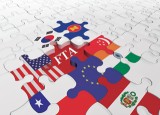The procedures of goods movement have become more favourable thanks to the ASEAN Single Window, ASEAN Customs Transit System, and ASEAN Harmonized Tariff Nomenclature.
The opening of a large common and busy market in ASEAN benefits Vietnam and other member states as providing better policies on competition and investment, transport infrastructure, energy, information technology, administration and consumption, she noted.
However, the binding technical standards could pose difficulties for domestic companies, she warned.
According to Trang, 46.79% of businesses proactively studied information on AEC.
However, among nearly 94% of businesses knowing the AEC, only 16.4% have fully understood about the community, she said, adding that this is due to the lack of effective information channels that help firms to learn about the market, partners, rivals and commodities in the area.
Vo Tri Thanh, a senior expert on ASEAN integration under the Central Institute for Economic Management, agreed that poor public awareness of AEC makes it impossible for domestic businesses to take full advantages of relevant cooperation agreements.
Businesses should look at opportunities stemming from the AEC beyond export turnover and trade to consumption production, services, investment, tourism and education, he suggested.
Most importantly, enterprises should know that the AEC is bringing brilliant chances for connectivity to look towards a green economy, he added.













